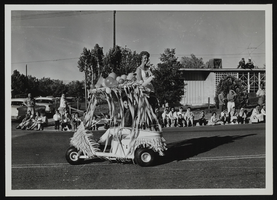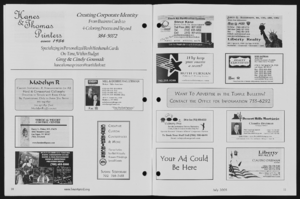Search the Special Collections and Archives Portal
Search Results
Anna Bailey oral history interview
Identifier
Abstract
Oral history interview with Anna Bailey conducted by Claytee White on March 03, 1997 for the Women's Research Institute of Nevada (WRIN) Las Vegas Women Oral History Project. Bailey opens her interview by describing her early life, family, and dance training. She discusses moving to Los Angeles, California at age fifteen, her first dancing gigs, and touring in London, England. She also talks about her experiences as an African American dancer including issues with segregation while touring in the southern United States. Bailey then discusses her life in Las Vegas, Nevada in the 1950s, and working as a dancer at the Moulin Rouge. She describes the club, the other dancers that performed there, and how the African American community felt when the club closed. Bailey then discusses how her husband and the entertainers Josephine Baker and Frank Sinatra helped integrate Las Vegas. She ends her interview by describing the last hotel she danced at, the Flamingo, where she performed in an integrated dance line.
Archival Collection
Tancy and Richard Leonard oral history interview
Identifier
Abstract
Oral history interview with Tancy and Richard Leonard conducted by Barbara Tabach on September 18, 2012 for the Boyer Early Las Vegas Oral History Project. In this interview, the Leonards discuss their respective parents' employment at the Nevada Test Site. Frances’ father, John Elmgren, was the liaison between Reynolds Electric and the Atomic Energy Commission. Tancy describes the difficulties that came with having a parent working at the test site, the Huntridge Movie Theater, Vegas Village, and living in Las Vegas, Nevada in the 1950s and 1960s. Later in the interview, Richard discusses his father’s employment at the test site, observing the detonation of bombs, and the secrecy surrounding his father’s work. Lastly, the two describe the Westside and the historical significance of that area.
Archival Collection
Martha Gould and Joan Kerschner oral history interview
Identifier
Abstract
Oral history interview with Martha Gould and Joan Kerschner conducted by Claytee D. White on October 26, 2005 for the Boyer Early Las Vegas Oral History Project. Gould and Kerschner discuss being librarians and directors working at the Nevada State Library. Gould then discusses being a lobbyist for libraries while Kerschner talks about also being a director of the Henderson Public Library.
Archival Collection
Jessie Emmett oral history interview
Identifier
Abstract
Oral history interview with Jessie Emmett conducted by Irene Rostine on October 16, 1996 for the Women's Research Institute of Nevada (WRIN) Las Vegas Women Oral History Project. Emmett discusses moving from Southern California to Nevada for her husband's job at the Nevada Test Site in 1954. Emmett goes on to discuss working at the New Frontier Hotel briefly, and her eventual decision to go into real estate. Emmett then talks about creating a real estate agent training program, and about the work environment for women real estate agents. Lastly, Emmett describes her experience running her own real estate office, and the personal satisfaction the job provided.
Archival Collection
Norma Morrow Zuckerman oral history interview
Identifier
Abstract
Oral history interview with Norma Morrow Zuckerman conducted by Barbara Tabach on April 18, 2016 and March 13, 2017 for the Southern Nevada Jewish Heritage Project. Zuckerman discusses growing up in the Los Angeles, California Jewish community and finding a profession in acting. She also talks about co-founding the Jewish Repertory Theatre of Nevada, the numerous plays that she has directed and performed in, and being a fashion designer.
Archival Collection

Mario Sandoval interview, December 6, 2018: transcript
Date
Archival Collection
Description
Interviewed by Claytee White. Mario and his six siblings were reared by a single mother who taught him all of the family recipes. Moving to Las Vegas at four years of age Mario remembers moving into a black neighborhood where the family was not welcomed. All windows in their home were broken into the first night. The family moved the next day. Though the new house was still in an African American neighborhood, they were protected by Vera, their black babysitter. Mario developed the intense work ethic of his mother, and after working in several strip casinos, found his home at the Horseshoe, today's Binion's. He has been there for 33 years; first as a busboy and then becoming a waiter. He is a Culinary Union trained shop student who picketed his beloved work place for ten months during a 1980's labor dispute. His work in life and union benefits have made his a very good life.
Text

Floats in the Henderson Industrial Days Parade: photographic print
Description
Teddie Lynn Brewer oral history interview
Identifier
Abstract
Oral history interview with Teddie Lynn Brewer conducted by Stanica Sretenovic on June 24, 2006 for the Public School Principalship Oral History Project. In this interview, Brewer reflects upon her 36-year career in education, with the bulk of those years being an administrator in the Clark County School District from 1985 to 2005. She discusses her teaching experience that led up to her pursuit of administration, and describes the regular duties that she faced as an elementary school principal. She also describes the importance of fostering relationships between teachers and administrators, and offers suggestions for how to foster such relationships.
Archival Collection

Lucela M. Wattin oral history interview: transcript
Date
Archival Collection
Description
Oral history interview with Lucela M. Wattin conducted by Stefani Evans on December 6, 2021 for Reflections: The Las Vegas Asian American and Pacific Islander Oral History Project. Lucela shares memories of her life growing up in Cebu Province, Philippines and being raised by her mother and grandparents after her father's death. She talks about immigrating to the United States under her fiancée's visa, moving to Chinatown in Las Vegas, and her work as a busser at the Excalibur Hotel. Lucela discusses how joining the Culinary Workers Union improved her work conditions and benefits, and how she is working with the union and a legal attorney to help her daughter immigrate to America. She also shares her favorite Filipino dishes (sinagang, chicken adobo, and bugas mais), holiday traditions, and what life was like when casinos shut down during COVID-19.
Text

